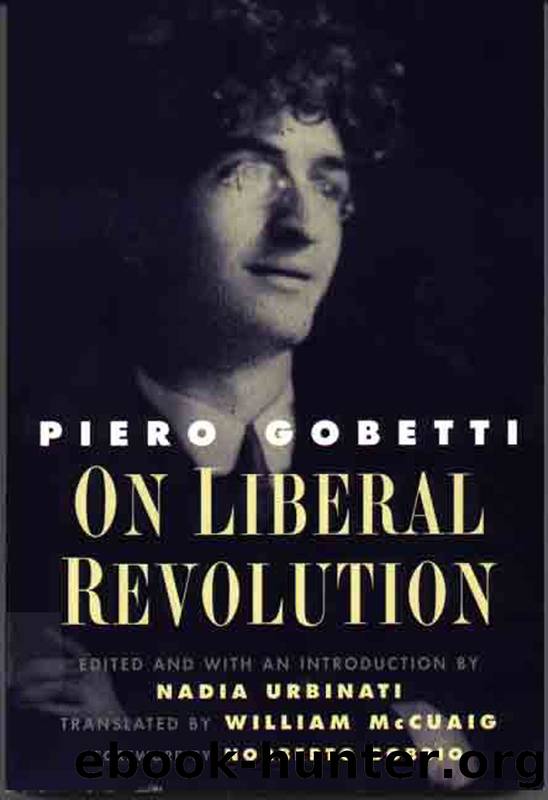On Liberal Revolution by Gobetti Piero Urbinati Nadia McCuaig William

Author:Gobetti, Piero,Urbinati, Nadia,McCuaig, William [Gobetti, Piero,Urbinati, Nadia,McCuaig, William]
Language: eng
Format: epub
ISBN: 9780300132960
Publisher: YaleUP
Published: 2000-09-15T05:00:00+00:00
Socialism and Initiative
Einaudiâs laissez-faire convictions, which he modestly prefers to limit to a descriptive or autobiographical account of psychological experience, rather than rigidify them into a theory, are in logical consequence frankly antisocialist and antidemagogic. He detests the rhetorical abuse that a host of scribblers, deficient in intelligent economic or technical experience, make of ready-made phrases, of the magic words âliberty,â âprogress,â âdemocracy.â. He likewise detests their refusal to search for any sense beneath those ready-made phrases and their opposition to any attempt to explain or justify them.
Einaudi critically examines state socialism and collectivism (especially in his article âIl governo delle coseâ [âThe Government of Things]) with perfect irony and the precise and penetrating style of a great writer; indeed, his hatred for empty declamation makes him go too far in one-sided rejection. Marx, for Einaudi, is never anything more than an example of the bad researcher, the sloppy collector of data who generalizes without sufficient analytical grounds, the economist who through naïveté or bad faith clings to the simplistic demagogic notion of surplus value. And a political movement inspired by such a bad scientist arouses a circumspect distrust in Einaudi. Nor from the economic point of view can we gainsay him; indeed, if his anti-Marxism is intended to teach a few solid lessons in economic science to the presumptuous apostles of new pseudotheories who in the name of Marx abandon Smith, Ricardo, industrial progress, and common sense, then we willingly side with him. But perhaps he goes astray by seconding the prejudices of Marxâs own unreliable followers and thereby regarding Marx as an economist when he was in fact a philosopher, historian, prophet, political agitatorâbut not an economist. Economics deals exclusively with reality and the past; it is the art of governmentâand is always ignored at the start by great movements that arise in the name of an overriding sense of urgency. The oversimplifications of Marx the economist favor the greatness of Marx the constructor of myths. And even if we do condemn the myth, we have to understand and admire his concrete endeavor to show the way to its realization by making it a problem of will and force. Would Einaudi not agree that, if we look closely, an ideal likeness (the one that unites all the great undertakings of history) can be found between the effort leading, in full liberty and independence, to the creation of the British empire and the free initiative from which the workers movement arises in correspondence with the real needs and the real aspirations of modern civilization, apart from its generic dogmatic postulates? Is Marxism not also, like English liberalism, a formal faith, an interpretation of the world, a method that cogently opposes all forms of utopian communism precisely because it denies their moralistic formulas? The workersâ movement is also a notable example of laissez-faire; it is also born without a theory. And it is our belief that the failure to recognize this fact (not so much in daily experience as in
Download
This site does not store any files on its server. We only index and link to content provided by other sites. Please contact the content providers to delete copyright contents if any and email us, we'll remove relevant links or contents immediately.
| Belgium | France |
| Germany | Great Britain |
| Greenland | Italy |
| Netherlands | Romania |
| Scandinavia |
Room 212 by Kate Stewart(5107)
The Crown by Robert Lacey(4810)
Endurance: Shackleton's Incredible Voyage by Alfred Lansing(4773)
The Iron Duke by The Iron Duke(4351)
The Rape of Nanking by Iris Chang(4208)
Joan of Arc by Mary Gordon(4104)
Killing England by Bill O'Reilly(3998)
Say Nothing by Patrick Radden Keefe(3976)
I'll Give You the Sun by Jandy Nelson(3431)
Shadow of Night by Deborah Harkness(3361)
Hitler's Monsters by Eric Kurlander(3331)
Mary, Queen of Scots, and the Murder of Lord Darnley by Alison Weir(3208)
Blood and Sand by Alex Von Tunzelmann(3199)
Eleanor & Park by Rainbow Rowell(3156)
Darkest Hour by Anthony McCarten(3121)
Margaret Thatcher: The Autobiography by Thatcher Margaret(3081)
Book of Life by Deborah Harkness(2935)
Red Famine: Stalin's War on Ukraine by Anne Applebaum(2930)
The One Memory of Flora Banks by Emily Barr(2857)
